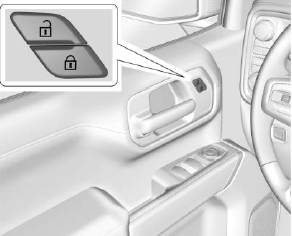Chevrolet Silverado: Trailer Towing / Launching and Retrieving a Boat
Backing the Trailer into the Water
Warning
- Have all passengers get out of the vehicle before backing onto the sloped part of the ramp. Lower the driver and passenger side windows before backing onto the ramp. This will provide a means of escape in the unlikely event the vehicle slides into the water.
- If the boat launch surface is slippery, have the driver remain in the vehicle with the brake pedal applied while the boat is being launched. The boat launch can be especially slippery at low tide when part of the ramp was previously submerged at high tide. Do not back onto the ramp to launch the boat if you are not sure the vehicle can maintain traction.
- Do not move the vehicle if someone is in the path of the trailer. Some parts of the trailer might be underwater and not visible to people who are assisting in launching the boat.
Disconnect the wiring to the trailer before backing the trailer into the water to prevent damage to the electrical circuits on the trailer. Reconnect the wiring to the trailer after removing the trailer from the water. If the trailer has electric brakes that can function when the trailer is submerged, it might help to leave the electrical trailer connector attached to maintain trailer brake functionality while on the boat ramp.
To back the trailer into the water:
- If equipped, place the vehicle in four-wheel-drive high.
- Slowly back down the boat ramp until the boat is floating, but no further than necessary.
- Press and hold the brake pedal, but do not shift into P (Park) yet.
- Have someone place chocks under the front wheels of the vehicle.
- Gradually release the brake pedal to allow the chocks to absorb the load of the trailer.
- Reapply the brake pedal. Then apply the parking brake and shift into P (Park).
- Release the brake pedal.
Pulling the Trailer from the Water
To pull the trailer out of the water:
- Press and hold the brake pedal.
- Start the engine and shift into gear.
- Release the parking brake.
- Let up on the brake pedal.
- Drive slowly until the tires are clear of the chocks.
- Stop and have someone pick up and store the chocks.
- Slowly pull the trailer from the water.
Once the vehicle and trailer have been driven from the sloped part of the boat ramp, the vehicle can be shifted from four-wheel-drive high. Shift into the drive mode that is appropriate for the road conditions.
Caution
If the vehicle tires begin to spin and the vehicle begins to slide toward the water, remove your foot from the accelerator pedal and apply the brake pedal. Seek help to have the vehicle towed up the ramp.
Maintenance when Trailer Towing
The vehicle needs service more often when used to tow trailers. See Maintenance Schedule. It is especially important to check the engine oil, axle lubricant, belts, cooling system, and brake system before and during each trip.
Check periodically to see that all nuts and bolts on the trailer hitch are tight.
Engine Cooling When Trailer Towing
The cooling system may temporarily overheat during severe operating conditions. See Engine Overheating.
 Parking on Hills
Parking on Hills
Warning
To prevent serious injury or death, always park your vehicle and trailer
on a level surface when possible.
When parking your vehicle and your trailer on a hill:
Press the brake pedal, but do not shift into P (Park) yet...
 Trailer Towing
Trailer Towing
If equipped with a diesel engine, see the Duramax diesel supplement.
Caution
Towing a trailer improperly can damage the vehicle and result in costly
repairs not covered by the vehicle warranty...
Other information:
Chevrolet Silverado 2019-2025 Owners Manual: Brake System Warning Light
Metric English This light should come on briefly when the vehicle is turned on...
Chevrolet Silverado 2019-2025 Owners Manual: Rear Windows. Power Sliding Rear Window
If equipped, the power sliding rear window works when the ignition has been turned on or to ACC/ACCESSORY, or Retained Accessory Power (RAP) must be active. See Retained Accessory Power (RAP). Press the switch to open the window. Pull the switch to close the window...
Categories
- Manuals Home
- 4th Generation Silverado Owners Manual
- 4th Generation Silverado Service Manual
- E85 or FlexFuel
- Tire Chains
- Jump Starting
- New on site
- Most important about car
Power Door Locks

If equipped with power door locks.
 : Press to lock the doors.
: Press to lock the doors.
